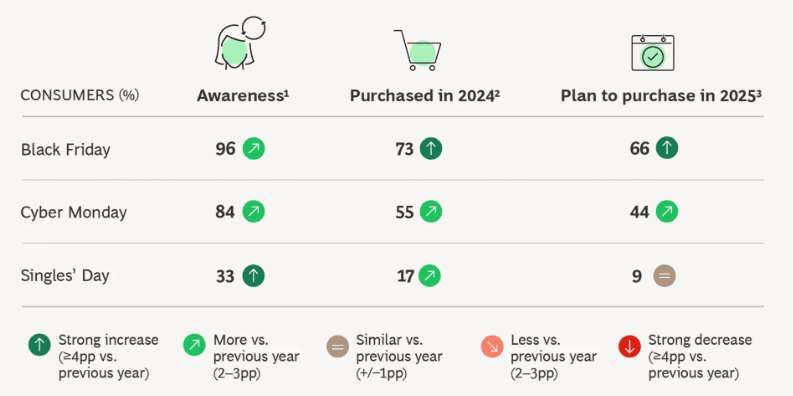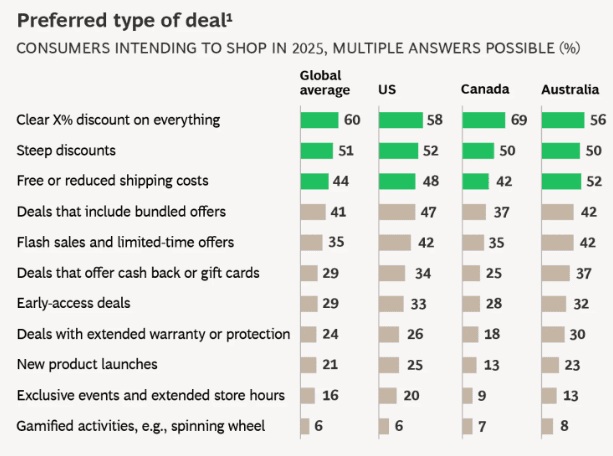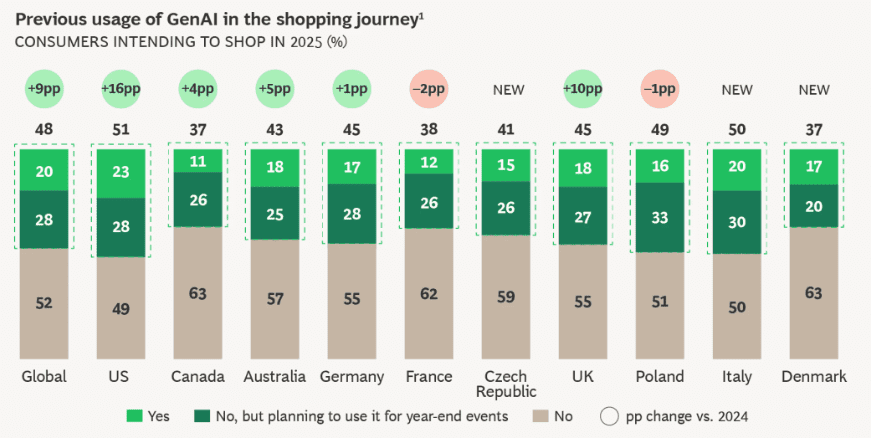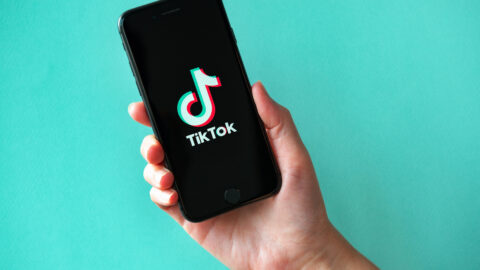2025 has been a year of sweeping change — both technologically thanks to AI, and economically as President Trump’s tariffs reshape the landscape of global trade. Not surprisingly, all this change has also shifted consumers’ shopping behaviors, and new research from consulting firm BCG showcases exactly how that’s playing out this holiday season.
The findings underscore the driven, deal-seeking behavior that consumers are bringing to this holiday season, something that has already been widely seen this year, as early as Amazon’s July Prime Day event. But while holiday shopping has been creeping earlier into the year for some time now, what’s becoming clear this year is that consumers are so intent on finding the best deals and saving money that they are willing to wait to buy — in particular for major holiday sales events like Black Friday — and they are drawing on the impressive research and deductive powers of AI to help them find the right time and place.
BCG’s annual Black Friday Report, Consumers Are Rewriting the Rules of Year-End Sales Events, found that both consumer awareness and shopping intent for year-end sales events like Black Friday and Cyber Monday are up: Consumer awareness of Black Friday is now at 96% among those surveyed (up 1 percentage point over 2024) and 84% for Cyber Monday (up 2 points), with around 79% of those aware of the sales saying they intend to shop them this year (up 4 points over 2024). Not only that, but 77% said they will delay some earlier purchases to take advantage of end-of-year discounts during these sales.
In tandem with that, almost half of those surveyed (48%) say they’ll use generative AI tools such as ChatGPT or Gemini to find deals, compare products and plan their purchases this year, and in the U.S. specifically that number sits at 51%.
“For retailers, addressing these developments requires engaging customers early and continuously, defending visibility within AI-driven shopping ecosystems, and ensuring clear and transparent communication while delivering promised discounts,” said the study’s authors in a blog post sharing the findings. “Year-end sales events are critical battlegrounds for consumer attention, and the winners will be those who engage early, safeguard their visibility and deliver on every promise, turning seasonal traffic into enduring loyalty.”
For its Black Friday Report, BCG surveyed 10,000 consumers between the ages of 18 and 75 across 10 countries in Europe, North America and Australia. Here’s more of what the company discovered:
- Sales events like Black Friday and Cyber Monday are taking on heightened importance amid the subdued consumer sentiment seen this year;
- Despite persistent economic uncertainty, shoppers this year are actually displaying slightly less conservative behavior than last year;
- When it comes to promotions, shoppers are seeking out clarity and fairness over gimmicks; and
- Usage of AI shopping tools is surging across countries and generations.
Desire to ‘Spend Smart’ is Driving Sales Patterns This Year
End-of-year sales events like Black Friday and Cyber Monday have become “global spending rituals,” as BCG described them, and these sale events take on a heightened importance amid the subdued consumer sentiment that this year has wrought.
This strategic, deliberate shopping behavior was already evident back in July during the Prime Day sales period when consumers showed a heightened sensitivity to price alongside a willingness to take their time over the extended four-day event to ensure they were getting the best deal.
Following Prime Day, Vivek Pandya, Director at Adobe Digital Insights said he expected those same patterns to continue into holiday shopping: “The consumer still has a strong perception that they’re going to get the absolute best deal on Black Friday,” he said on the Retail Remix podcast. “That becomes even more important [this year] because you see the consumer prioritizing price over speed, efficiency, convenience. What is absolutely clear is that consumers will be very strategic and conscientious about where they can get the best absolute value.”

While BCG found that the majority of consumers (60%) planned to begin holiday shopping by late October/early November, more than one-quarter (28%) said they intended to lean into last-minute sales opportunities as they arise, a slight increase from 2024.
“Economic caution continues to influence global shopping habits,” said Tiffany Yeh, Managing Director and Partner at BCG in an interview with Retail TouchPoints. “Even as inflation stabilizes, the impact of higher living costs and interest rates persists. As a result, shoppers treat year-end sales not as impulsive splurges but as strategic opportunities to save, manage budgets and stretch their spending power.”
Consumer Confidence May be Recovering
Interestingly, despite persistent geopolitical tensions and economic uncertainty, shoppers this year are displaying slightly less conservative behavior than they did in 2024.
While many continue to trade down — with 38% buying more at discounters, 35% choosing more affordable brands and 28% purchasing more private-label goods in the three months prior to the survey — these percentages are slightly lower than those found in the 2024 survey. And shoppers in many markets report smaller net spending reductions in the previous six months compared to the 2024 results, particularly for furniture, jewelry and clothing.
According to BCG, this and other indicators point to a nascent recovery in consumer confidence and willingness to spend. In fact, the survey found that the share of consumers who feel pressure on their personal finances has actually decreased, with fewer respondents reporting difficulties affording household expenses (41%) or needing to use savings for daily outlays (45%) — both 2 points lower than in 2024. This is notable since consumers clearly still have lingering concerns over the broader economic environment — 81% of respondents also said they were concerned about recent price increases for essentials, 71% fear that tariffs and duties will raise prices, and nearly half say they have reduced non-essential spending and are monitoring prices more closely in recent months.
And, while consumers are highly price-focused this year, “they are also demonstrating a ‘smart splurge’ mindset,” said Yeh. “56% use year-end sales to stock up on essentials, yet 44% are also channeling some of their budgets toward higher-priced discretionary items, up two points from 2024. This suggests that shoppers are balancing practicality with self-reward — saving on necessities while indulging in small luxuries as justified treats. Flexible payment options, used by about 40% of consumers, make these indulgences easier to rationalize alongside value-driven purchases. Overall, shoppers are spending consciously while still seeking small moments of satisfaction.”
Shoppers Want Deals that are Simple and Transparent
When it comes to how to capture shoppers’ attention throughout the season, a straightforward approach is clearly the way to go. The BCG survey found that “value consistency” far outweighs innovative deal offers. While shoppers remain price-sensitive, they also want simplicity, transparency and reliability, and as such are seeking out clarity and fairness over gimmicks.

An “x% off everything” remains the most popular deal type for about 60% of shoppers (up 1 point over 2024), far ahead of gamified or conditional offers, at about 6%. The main threshold for a good deal is similar to 2024 — a discount of around 30%. The second- and third-most-popular deal types include “steep discounts” (51% of shoppers) and “free/reduced shipping costs” (44%) — both 2 points lower than in 2024.
As a result, BCG recommends that retailers use transparent price histories and consistent discount logic across channels to reinforce trust this holiday season.
AI is Helping Consumers Achieve Their Holiday Goals

Helping out this year’s strategic holiday shoppers are new Gen AI tools like ChatGPT and Google AI, with usage surging across countries and generations. In fact, 48% of consumers have already used or are planning to use Gen AI during year-end sales events, a 9-point increase over 2024 with the top use cases being product comparisons (46%), deal-hunting (44%) and product research (42%).
Usage also is expanding among older groups, with 42% of Gen X (up 8 points) and 31% of Boomers (up 7 points) having used AI tools to shop or say they’re planning to. Still, momentum remains strongest among younger shoppers.
“Optimizing product data and content for GenAI and answer engines will be essential for maintaining visibility where purchase decisions increasingly occur,” said Yeh. “[Additionally], strengthening owned channels — including loyalty programs, apps and personalized offers — can help retailers deliver differentiated experiences and maintain control of customer relationships.”













